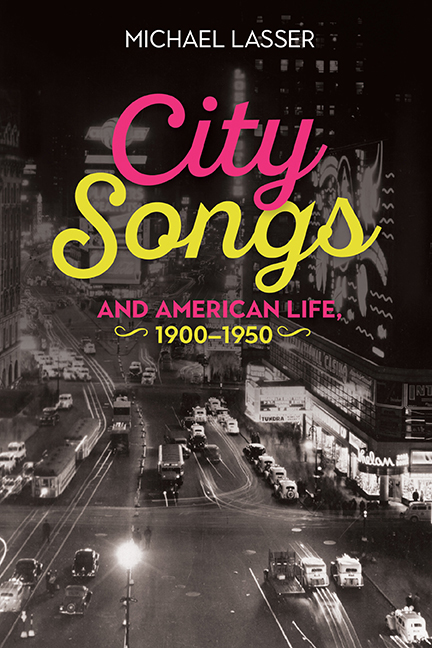Book contents
- Frontmatter
- Dedication
- Epigraph
- Contents
- Notes to the Reader
- Introduction: Encountering the City
- 1 The City's Clangor
- 2 Broadway's Melody
- 3 Harlem's Renaissance
- 4 Recordings, Radio, and Talkies
- 5 Starting the Century
- 6 The Flapper and the Jazz Age
- 7 The Great Depression
- 8 World War II
- Afterword
- Notes
- Bibliography
- Miscellaneous Endmatter
- Frontmatter
- Dedication
- Epigraph
- Contents
- Notes to the Reader
- Introduction: Encountering the City
- 1 The City's Clangor
- 2 Broadway's Melody
- 3 Harlem's Renaissance
- 4 Recordings, Radio, and Talkies
- 5 Starting the Century
- 6 The Flapper and the Jazz Age
- 7 The Great Depression
- 8 World War II
- Afterword
- Notes
- Bibliography
- Miscellaneous Endmatter
Summary
In 1938, the bandleader Harry James's recording of a new ballad called “I'll Be Seeing You,” with a vocal by a little-known crooner named Frank Sinatra, made barely a ripple. It was just another song that failed to survive the Depression, its imagery of a carousel and a wishing well too precious by half. Six years later, though, its conjuring up of memory and anticipation transformed it into a persuasively simple expression of how America felt in a different kind of troubled time. This Depression flop became one of the biggest hits of World War II. Its mournfully sweet melody and its imagery of childhood and first love had felt mawkish during the 1930s but now struck a responsive chord; its references, while specific, could be located anywhere. Like so many wartime hits, it sang about parting, separation, longing, loneliness, and the dream of return. After failing six years earlier, it now reminded lovers of what they remembered and desired. The title line, initially a casual conversational farewell, became an affirmation of lasting devotion in a war-torn world. (Sammy Fain and Irving Kahal, “I'll Be Seeing You,” Right This Way, 1938).
The places the lover remembers were gone, not because they had suddenly turned to rubble, but because the young man who had wooed in their shadow was gone. Neither recollection nor desire had the power to bring him home again. In the United States at the height of World War II, more than 12 million men left home to serve in the armed forces. More than 6 million women took jobs; 3 million “went to work who would not have worked if there hadn't been a war.” Many of these working women chose to leave home to find a job in a defense plant or on a farm and were away for the duration of the war. Even for those who stayed put, the sense of upheaval was profound. The popular music of World War II gave them an anchor; it understood how they felt. In his oral history of the war years, Archie Satterfield wrote that “the absence of an entire generation of men between the ages of seventeen and thirty leaves a lonely void in a nation, and a common refrain among the young women was that they got sick and tired of talking only to other women, kids, and old men.”
- Type
- Chapter
- Information
- City Songs and American Life, 1900–1950 , pp. 232 - 276Publisher: Boydell & BrewerPrint publication year: 2019



